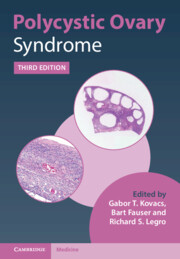Book contents
- Polycystic Ovary Syndrome
- Polycystic Ovary Syndrome
- Copyright page
- Contents
- Contributors
- Chapter 1 Introduction to and History of Polycystic Ovary Syndrome
- Chapter 2 Polycystic Ovary Syndrome: From Phenotype to Genotype
- Chapter 3 The Epidemiology of Polycystic Ovary Syndrome
- Chapter 4 Ovarian Ultrasonography in Polycystic Ovary Syndrome
- Chapter 5 The Classification of Polycystic Ovary Syndrome Informed by the International Guideline 2018
- Chapter 6 The Relevance of the Anti-Müllerian Hormone in Polycystic Ovary Syndrome Diagnosis and Management
- Chapter 7 Origins of Polycystic Ovary Syndrome In Utero
- Chapter 8 Adrenal and Polycystic Ovary Syndrome
- Chapter 9 Polycystic Ovary Syndrome and Environmental Toxins
- Chapter 10 Lifestyle in Polycystic Ovary Syndrome
- Chapter 11 Ovulation Induction in Polycystic Ovary Syndrome
- Chapter 12 Ovarian Surgery for Ovulation Induction
- Chapter 13 In Vitro Fertilization and Assisted Reproductive Technologies in Polycystic Ovary Syndrome
- Chapter 14 Pregnancy Complications and Children Outcomes in Patients with Polycystic Ovarian Syndrome
- Chapter 15 The Role of In Vitro Maturation in Polycystic Ovary Syndrome
- Chapter 16 The Treatment of Obesity in Polycystic Ovary Syndrome
- Chapter 17 Mood Disorders in Polycystic Ovary Syndrome
- Chapter 18 The Long-Term Health Consequences of Polycystic Ovary Syndrome
- Chapter 19 Polycystic Ovary Syndrome
- Chapter 20 Cancer and Polycystic Ovary Syndrome
- Index
- References
Chapter 7 - Origins of Polycystic Ovary Syndrome In Utero
Published online by Cambridge University Press: 13 May 2022
- Polycystic Ovary Syndrome
- Polycystic Ovary Syndrome
- Copyright page
- Contents
- Contributors
- Chapter 1 Introduction to and History of Polycystic Ovary Syndrome
- Chapter 2 Polycystic Ovary Syndrome: From Phenotype to Genotype
- Chapter 3 The Epidemiology of Polycystic Ovary Syndrome
- Chapter 4 Ovarian Ultrasonography in Polycystic Ovary Syndrome
- Chapter 5 The Classification of Polycystic Ovary Syndrome Informed by the International Guideline 2018
- Chapter 6 The Relevance of the Anti-Müllerian Hormone in Polycystic Ovary Syndrome Diagnosis and Management
- Chapter 7 Origins of Polycystic Ovary Syndrome In Utero
- Chapter 8 Adrenal and Polycystic Ovary Syndrome
- Chapter 9 Polycystic Ovary Syndrome and Environmental Toxins
- Chapter 10 Lifestyle in Polycystic Ovary Syndrome
- Chapter 11 Ovulation Induction in Polycystic Ovary Syndrome
- Chapter 12 Ovarian Surgery for Ovulation Induction
- Chapter 13 In Vitro Fertilization and Assisted Reproductive Technologies in Polycystic Ovary Syndrome
- Chapter 14 Pregnancy Complications and Children Outcomes in Patients with Polycystic Ovarian Syndrome
- Chapter 15 The Role of In Vitro Maturation in Polycystic Ovary Syndrome
- Chapter 16 The Treatment of Obesity in Polycystic Ovary Syndrome
- Chapter 17 Mood Disorders in Polycystic Ovary Syndrome
- Chapter 18 The Long-Term Health Consequences of Polycystic Ovary Syndrome
- Chapter 19 Polycystic Ovary Syndrome
- Chapter 20 Cancer and Polycystic Ovary Syndrome
- Index
- References
Summary
Polycystic ovarian syndrome (PCOS) affects up to 18% of women internationally, with widespread effects on their reproductive, metabolic and cardiovascular health. To date, the etiology of this syndrome remains unclear. Patterns of expression within family groups suggest a genetic inheritance but neither a clear inheritance pattern nor candidate gene(s) has been discovered to date. Animal studies have proven that in utero exposure to high levels of androgen can elicit PCOS-like traits in various mammals, including rhesus monkeys who share a similar reproductive biology with humans. An alternate mechanism for etiology is the epigenetic alteration in programming of the fetal ovaries in response to androgen exposure. This chapter summarizes the evidence available and hypothesizes possible mechanisms of action via which PCOS could be transmitted from an affected mother to her offspring. The origins of androgens in the fetal circulation as well as the role of AMH and luteinizing hormone (LH) are discussed as are the actions of the placenta and the difference in placental function and hormone secretion patterns in PCOS females compared to “normal” physiology.
Keywords
- Type
- Chapter
- Information
- Polycystic Ovary Syndrome , pp. 58 - 66Publisher: Cambridge University PressPrint publication year: 2022

